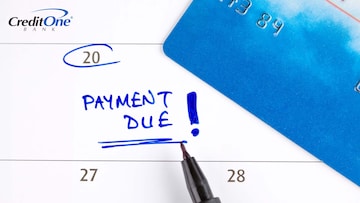Getting the Most Out of Your New Credit Card
October 01, 2024
Topics:
Credit CardHow you treat your new credit card is crucial. It can mean the difference between a challenge with credit and a healthy financial life.

Introduction
Getting approved for a new credit card is exciting. Congratulations! It can feel like a whole new world has just opened up to you.
But don’t forget that managing your credit card properly from the beginning is key to a healthy financial life. Luckily, there are tried-and-true methods to help you manage your credit card account and build a positive financial future.
Let’s look at what elements to keep in mind and how to start off on the right foot.
How Your Credit Card Affects Your Finances
You already know that a credit card gives you the ability to pay for things, even if you don’t have the money right now to buy them. But that can be a double-edged sword.
Perhaps less obvious is that your credit card can impact your financial future in larger ways, either positively or negatively. Depending on how you manage your card, it can help boost your credit score, or it can damage your credit score. And your credit score affects your entire financial life, including the terms you can get on loans, the interest rate you’ll pay on borrowing, and the additional fees you may end up paying.
But it’s not all about your credit score. In addition, being strategic will help you avoid potential fraud and identity theft, while saving time and resources.
5 Tips for Managing Your Credit Card Account
Getting the most out of your new credit card requires understanding and following a few simple strategies.
1. Make timely payments
You might not realize this, but your payment history is the most important factor affecting your credit score. That means paying on time, every time, is the best thing you can do for your finances.
It’s important to pay at least the minimum due so you can avoid late fees and black marks on your credit report. But paying more than the minimum — the full balance whenever possible — helps keep your credit utilization ratio low and reduce interest charges.
2. Maintain a good utilization ratio
Your credit utilization ratio is how much of your available credit you’re actually using at any given time. If you tend to use your full credit line and max out your cards, this is an important stat to keep top of mind.
Maintaining a healthy credit utilization ratio will improve your credit score. Experts recommend keeping your balance below 30% of your credit limit to give your credit score a boost. If you can charge up less than 10% of your credit limit, even better.
Keeping your utilization low also gives you more available credit for emergency purposes, and reduces the chance of going over your limit, which could result in getting charged more fees.
3. Become digitally engaged
There was a time when credit card statements and other documents were always printed and sent through the mail. But these days, after you receive your physical card with the welcome package, there’s no reason to keep dealing with paper.
Consider signing up for paperless documents, which reduces paper clutter, helps the environment, and prevents unnecessary delays in receiving important information. Not to mention that your statement can’t get lost or stolen if you access it online or through a mobile app.
Technology is also your friend when it comes to ease of use. Going digital gives you the convenience of logging in from the palm of your hand, receiving crucial alerts and notifications in real time, and making payments within seconds — or even automatically.
4. Maximize rewards and perks
Earning credit card rewards when you shop, or getting discounts and special offers, shouldn’t be the primary focus of your cardmember experience. But they sure are nice to have.
You can maximize the credit card rewards you earn by focusing your spending on the categories that earn you the most points or cash back. For example, if you earn 5% cash back rewards on gas and groceries, use that card for those types of purchases. If you earn 5X points on flights, make sure you use that card for booking your vacation travel.
Don’t forget to redeem your rewards before they expire, and watch for additional opportunities to earn bonus rewards or discounts. Of course, paying off your full balance each month helps ensure that your rewards don’t get eaten up by interest charges.
5. Avoid credit card fraud
Scammers are always looking for ways to steal credentials, money, and even identities. Protect yourself by choosing strong passwords for your online accounts, and never sharing your personal information or login credentials with anyone who contacts you asking for it. That includes clicking on links in emails or text messages. If it’s an official communication, it should include verification of your account number.
Understanding the anatomy of a scam further helps you avoid falling prey. Most scams involve heightened emotion, like fear or greed, combined with a sense of urgency. And there’s usually a specific and unusual payment method required, like cryptocurrency, cash, or gift cards. So prizes that you need to pay for, a government agency demanding immediate payment, or a grandchild who’s allegedly stranded in Mexico all often turn out to be scams.
If you take precautions but still see an unexpected charge on your statement, list of transactions, or credit report, call your credit card company to verify and dispute the charges. For your Credit One Bank account, you can contact Customer Service at 877-825-3242. If your card has been lost or stolen, your creditor will likely cancel the card and issue a new one with a different account number.
Bottom Line
Credit cards are small pieces of plastic that usually stay out of sight, so it’s easy to ignore or neglect them. Many people fall into the trap of maxing out their cards, forgetting to pay on time, or carrying too large a balance from month to month — all of which can wreak havoc on your finances.
But if you start with a plan to manage your credit card account optimally, even before you receive it, you’ll be in a much better place to keep your financial life in order. Following a few proven strategies along the way can also help you improve your credit score, no matter where it currently stands.



